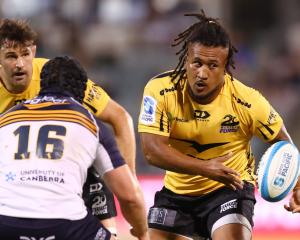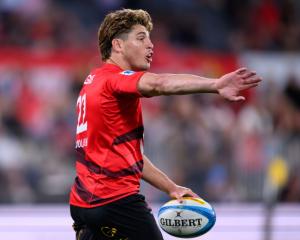Skinstad, who earned 42 caps and scored 55 points as a loose forward between 1997-2007, also had a few suggestions for New Zealanders relating to hosting next year's World Cup.
He is in New Zealand filming for South African sports channel SuperSport, in conjunction with Tourism New Zealand, putting together a series of 30-minute documentaries to screen in South Africa focusing on New Zealand as a destination "beyond the rugby field".
However, what had happened on the rugby field in the past fortnight was a hot topic of conversation.
While the All Blacks were playing a "fantastic blend of rugby" and were "very, very good" at Eden Park, "the 'Boks were bad", Skinstad said.
"South Africa weren't up to speed in Auckland ... [or] Wellington.
"They got blown away at Eden Park and they improved, but they didn't have enough in Wellington.
"For 100 years, coming to New Zealand and winning has been difficult [so] I'm not that surprised ... [South Africa] will be very disappointed with their last two weeks, but they understand the quality of the opposition and the All Blacks are playing a decent blend of rugby."
The rugby player turned businessman, commentator and "part-time adventurer" said the pressure on the All Blacks before the July 10 Tri-Nations opener was immense - he could not recall seeing that much pressure on an All Black team or its management.
"It was a collective sigh of relief [when they won] - South Africa will look back and see it from that perspective."
However, anything could happen before the 2011 World Cup in New Zealand, from which teams were "a long way out".
"It will be a tough one - the All Blacks will be very hard to beat here; that said ... the most important thing at a World Cup [is] you can pre-plan it as long as you want ... as soon as you take something for granted that something will come back and slap you in the face.
"I was in a World Cup where South Africa almost lost to Fiji [in 2007].
"Twenty of the 22 [Springboks] were at the last World Cup, they understand the pressure better than anyone in our country.
"They are quite immediate in terms of their goals - they will want to challenge for the Tri-Nations, they can't really take baggage with them in these kinds of test matches.
"Winning is a habit and so, unfortunately, is losing.
"You have just got to remember what to do more of."
Skinstad said the warm and welcoming nature of New Zealanders accounted for "95% of a destination", and advised Kiwis to remember that next year, as there was a risk of concentrating more on an All Black World Cup win than on hosting the tournament.
"At the football World Cup, we had the advantage of knowing we [South Africa] weren't going to win it - we're not a good enough footballing nation, so we concentrated on the hosting."
Skinstad said while many New Zealanders were focusing on that, some were "worried about whether New Zealand are going to win it or not".
"The more they concentrate on hosting, the more they're going to enjoy it."
As with the football World Cup, the legacy of RWC 2011 was going to be the infrastructure - provided it was left behind.
In South Africa, new stadiums were being used to host events, while buildings they replaced were being turned into sports institutes and in some cases used for accommodation.












